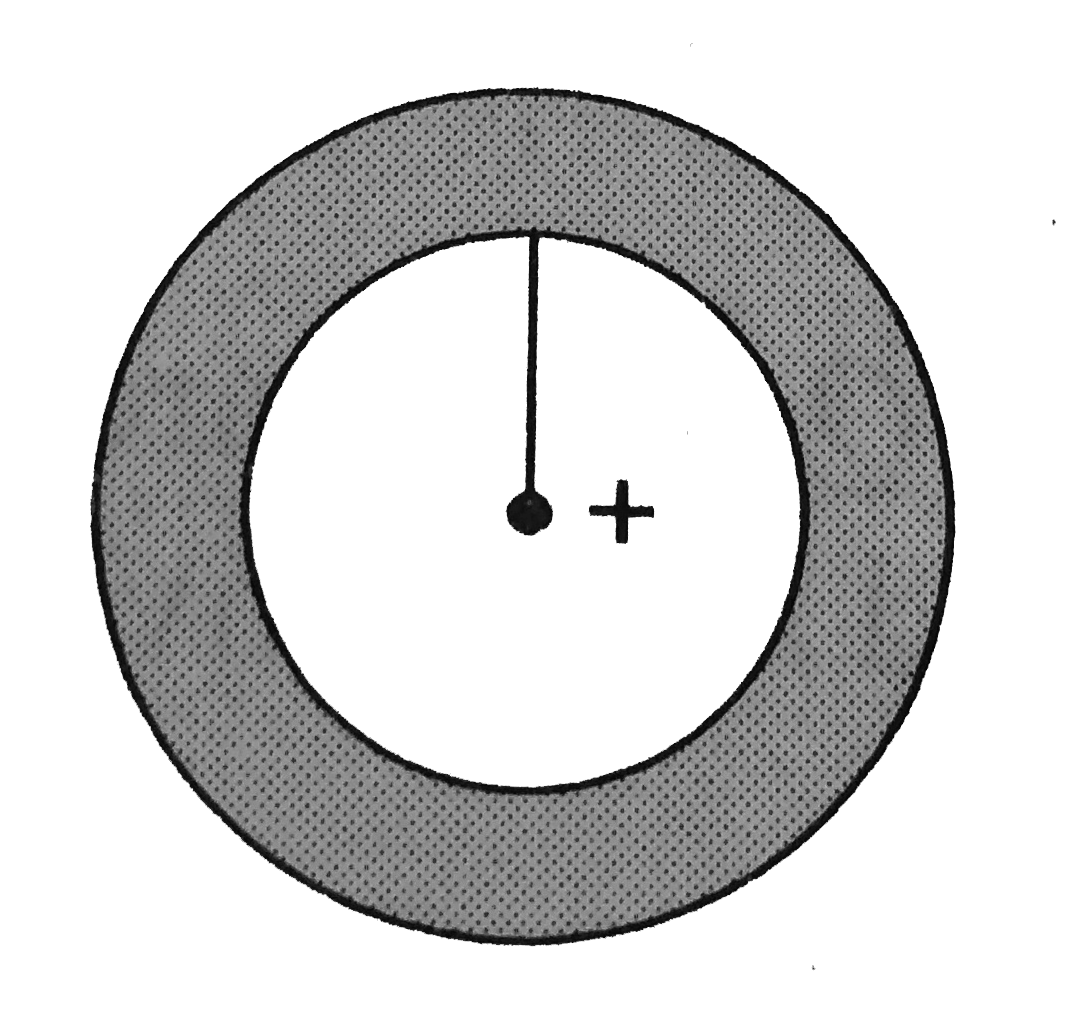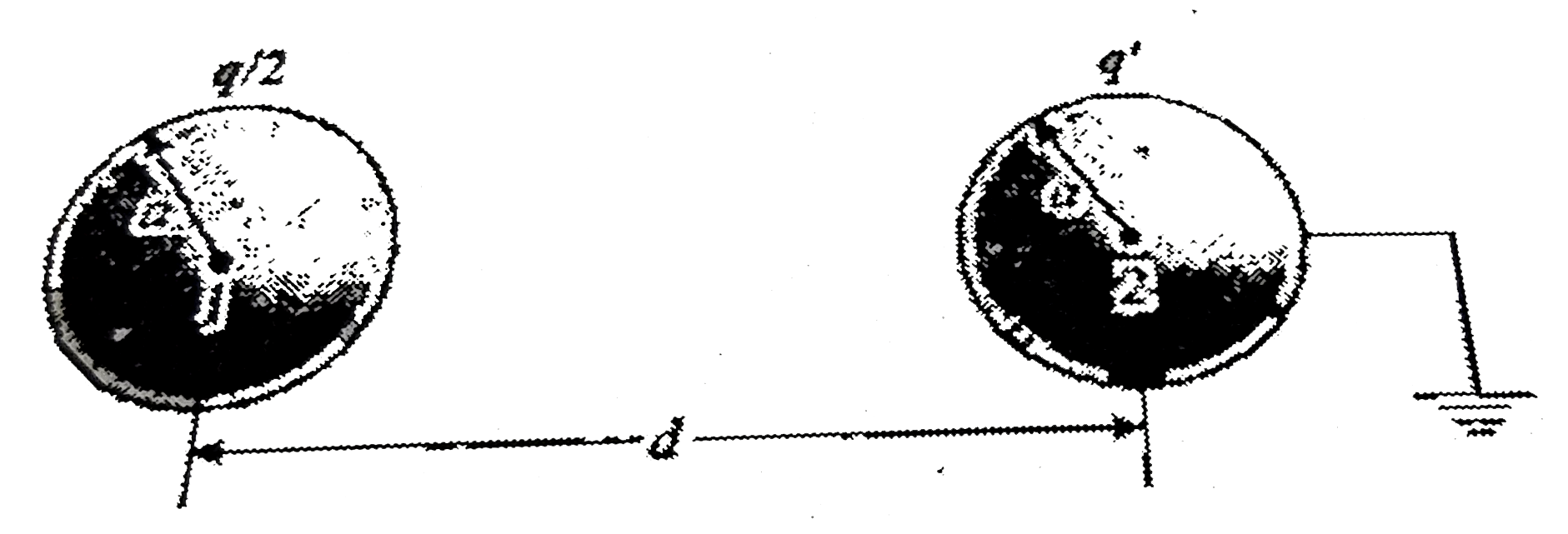A ball of charge q is plaed in a hollow conductive uncharged sphere. After this, the sphere is connected with earth for a short time and the ball is then removed from the sphere. The ball has not been brought into contact with the sphere. What charge will the sphere have after these operations? Where and how will this charge the distributed?Solution in Punjabi
Step by step video & image solution for A ball of charge q is plaed in a hollow conductive uncharged sphere. After this, the sphere is connected with earth for a short time and the ball is then removed from the sphere. The ball has not been brought into contact with the sphere. What charge will the sphere have after these operations? Where and how will this charge the distributed? by Physics experts to help you in doubts & scoring excellent marks in Class 12 exams.
Updated on:21/07/2023Topper's Solved these Questions
- ELECTRIC FIELDBOOK - MODERN PUBLICATIONCHAPTER - ELECTRIC FIELDEXERCISE - EXERCISE
95 Videos
- ELECTRIC CURRENT. RESISTANCE AND E.M.FBOOK - MODERN PUBLICATIONCHAPTER - ELECTRIC CURRENT. RESISTANCE AND E.M.FEXERCISE - EXERCISE
64 Videos
- ELECTRIC POTENTIALBOOK - MODERN PUBLICATIONCHAPTER - ELECTRIC POTENTIALEXERCISE - EXERCISE
38 Videos
Similar Questions
In defining electric field due to a point charge, the test charge has to be vanishingly small. How this condition can be justified, when we know that charge less than the on an electron or a proton is not possible?
View SolutionWhat is drift velocity of electrons? How do you explain the flow of current in a conductor based on this?
View SolutionFind an expression for line integral of electric intensity.
View SolutionThere are two uncharged identicasl metallic spheres 1 and 2 of radius r separated by a distance d(d>>r). A charged metalllic sphere of same radius having charge q is touched with one of the sphere. After some time it is moved away fom the system. Now, the uncharged sphere is earthed. Charge on earthed sphere is
View SolutionTwo identical conduction spheres, one having an initial charge +Q and the other initially uncharged, are brought into contact.
(a) What is the new charge on each sphere?
(b) While the spheres are in contact, a positively chaged rod is moved close to one sphere, causing a redistribution of hte charges on the two spheres so the charge on hte sphere closest to the rod has a charge-Q. What is the charge to the other sphere?
View SolutionTwo identical conducting spheres are charged by induction and then sepatatd by a large distance, sphere-1 has charge +Q and spher-2 has charge -Q. A third sphere is initially uncharged. If sphere-3 is touched to sphere-1 and sepatated and then touched to sphere-2 and separated what is the final charge on each of the three spheres?
View SolutionA ball of charge q is placed in a hollow conducting uncharged sphere. After this, the sphere is connected with earth for a short time and the ball is then removed from the sphere. The ball has not been brought into contact with the sphere. a. What charge will the sphere have after these operations? Where and how will this charge be distributed? b. What will be the electric field inside as well as outside the sphere?
View SolutionAn electrically isolated hollow (initially uncharged), conducting sphere has a small positively charged ball suspended by an insulating rod from its inside surface (see diagram).

This causes the inner surface of the sphere to become negatively charged. When the ball is centred in the sphere, the electric field outside the conducting sphere is
View SolutionCharge q on a small conducting sphere S_(1) is placed inside a large hollow metallic sphere S_(2) having a charge Q as shown in figure. The sphere is connected to shell by a conducting wire. The charge on S_(1) will then be
View SolutionThere are two uncharged identical metallic spheres of radius a, separated a distance d. A charged metallic sphere (charge q) of sarue radius is brought and touches sphere 1. After some time it is moved away to a far off distance. After this, the sphere 2 is earthed. Find the charge on sphere 2.

View Solutionएक चालक गोले पर आवेश - 50e है तथा दूसरे समान गोले पर आयेश + 20e है। यदि दोनों गोलों का स्पर्श कराकर अलग कर दिया जाए, तो प्रत्येक पर आवेश होगा :
View SolutionA positively charged ball is brought close to a neutral conducting isolated sphere. The isolated sphere is grounded for an instant and then the ground connection is removed. Consider the following statements .
STATEMENT-1: The sphere will acquire a negative charge after this process.
and
STATEMENT-2 : If the sphere is kept grounded and positively charged ball is moved away, the sphere will again become neutral.
View Solutionआवेश −50e की एक बॉल को एक खोखले गोले के केन्द्र पर रखा है, जिसका कुल आवेश −50e है | खोखले गोले के बाह्म पृष्ठ पर आवेश होगा
View SolutionAssume three concentric, conducting spheres where charge 4, and q, have been placed on inner and outer sphere where as middle sphere has been earthed. Find the charge on the outer surface of middle spherical conductor
View Solutionतीन समान धातु के गोले A, B एवं C लेते है। गोले A पर आवेश + 6q एवं गोला B पर आवेश -3q है। गोला C पर कोई आवेश नहीं है। गोला A एवं B को सम्पर्क में लाया गया फिर हटा दिया गया। अब A को C के सम्पर्क में लाया गया फिर हटा लिया गया। अन्त में गोले C को B के सर्पक में लाया जाता है। व हटा लिया जाता है। C पर अन्तिम आवेश ज्ञात करो।
View SolutionThere are two uncharged identicasl metallic spheres 1 and 2 of radius r separated by a distance d(d>>r). A charged metalllic sphere of same radius having charge q is touched with one of the sphere. After some time it is moved away fom the system. Now, the uncharged sphere is earthed. Charge on earthed sphere is
View Solution
